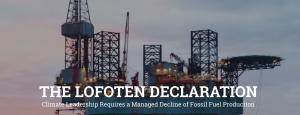Author – Hannah McKinnon – OCI
Yesterday, a pair of declarations representing close to 500 organizations and 140 leading economists respectively were submitted to the United Nations Framework Convention on Climate Change (UNFCCC) calling on countries and the process to address fossil fuel production and financing as a critical way of increasing ambition and meeting our shared climate goals.
The Lofoten Declaration and the Not A Penny More Declaration are a call to stop letting fossil fuels, and the governments and money that enable them, off the hook. Despite decades of negotiations and agreements, and being the biggest driver of the climate crisis, fossil fuels aren’t even mentioned in the Paris Agreement.
It is time for this to change: if we are going to avert the worst of global climate change we must address fossil fuel demand AND supply. We know that there is more carbon in already producing reserves to take us beyond 1.5 or even 2 degrees. We cannot continue to allow governments and industry to expand and finance new fossil fuel production that only digs us deeper into the hole we are trying to get out of.
The Declarations affirm that it is the urgent responsibility and moral obligation of wealthy fossil fuel producers as well as public and private investors and development institutions to lead in “stopping exploration and expansion of fossil fuel projects and managing the decline of existing production in line with what is necessary to achieve the Paris climate goals.”
These submissions to the UNFCCC’s “Talanoa Dialogue” add to growing calls for action on ending fossil fuels within the UN process and beyond. Outside of these walls, movements around the world are standing up to fossil fuel infrastructure and expansion. From First Nations and allies in British Columbia standing up to the Kinder Morgan tar sands pipeline to civil society and frontline communities in Argentina demanding a different development pathway to avoid the dangerous exploitation of massive shale oil and gas reserves, the resistance is global.
 Some countries and institutions are also showing leadership and introducing policies that begin to tackle this problem at its source. On Saturday, panelists from New Zealand, France, and the World Bank addresseda packed room here at the latest round of climate talks in Bonn to share stories about how and why they are making moves to stop approving and financing fossil fuel expansion. These First Movers are setting important precedents that pave the way for even more ambitious actions to begin a managed decline and just transition towards a zero-carbon economy.
Some countries and institutions are also showing leadership and introducing policies that begin to tackle this problem at its source. On Saturday, panelists from New Zealand, France, and the World Bank addresseda packed room here at the latest round of climate talks in Bonn to share stories about how and why they are making moves to stop approving and financing fossil fuel expansion. These First Movers are setting important precedents that pave the way for even more ambitious actions to begin a managed decline and just transition towards a zero-carbon economy.
In order for this list of First Movers to grow, more political and financial decision makers must see the writing on the wall and say no to the fossil fuel industry. As Lofoten Declaration signatory Secretary General Martel of the Pacific Island Development Forum importantly notes, “the only reason why fossil fuel exploration continues is because of powerful people with vested interests and the political influence that they wield. The Lofoten Declaration is sending the message that there is no future for fossil fuels in a planet experiencing the current level of climate change. It stands to reason that fossil fuel exploration, and eventually production, must come to an end if we are to fulfil the commitments of the Paris Agreement which almost all countries in the world have now ratified.”
We look forward to these powerful Declarations joining the many other calls heard in the Talanoa Dialogue for the need to address fossil fuel supply. The role of fossil fuel production in the climate crisis must be confronted head on, and the UNFCCC is no exception.